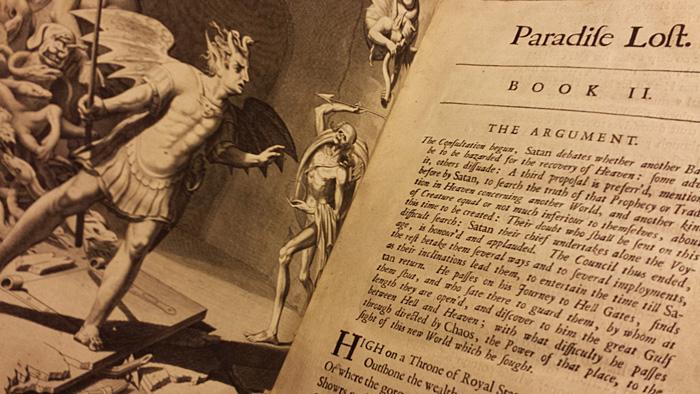

In Pandæmonium, the capital city of Hell, Satan employs his rhetorical skill to organise his followers he is aided by Mammon and Beelzebub. It begins after Satan and the other fallen angels have been defeated and banished to Hell, or, as it is also called in the poem, Tartarus. Milton's story has two narrative arcs, one about Satan ( Lucifer) and the other, Adam and Eve. The poem follows the epic tradition of starting in medias res ( in the midst of things), the background story being recounted later. Respectively, these probably represent the double fall of humanity embodied in Adam and Eve, as well as Satan's fall from Heaven. In Book 9, a verse describing the serpent which tempted Eve to eat the forbidden fruit in the Garden of Eden spells out "SATAN" (9.510), while elsewhere in the same book, Milton spells out "FFAALL" and "FALL" (9.333). Milton used a number of acrostics in the poem. In later printing, "Arguments" (brief summaries) were inserted at the beginning of each book. However, in the 1672 edition, the text was reorganized into twelve books. In the 1667 version of Paradise Lost, the poem was divided into ten books. Veres oft, as oft so steers, and shifts her Saile Nigh Rivers mouth or Foreland, where the Wind To interrupt, side-long he works his way.Īs when a Ship by skilful Stearsman wrought With tract obliqueĪt first, as one who sought access, but feard He also wrote the epic poem while he was often ill, suffering from gout, and despite suffering emotionally after the early death of his second wife, Katherine Woodcock, in 1658, and the death of their infant daughter.

Having gone blind in 1652, Milton wrote Paradise Lost entirely through dictation with the help of amanuenses and friends. Leonard also notes that Milton "did not at first plan to write a biblical epic." Since epics were typically written about heroic kings and queens (and with pagan gods), Milton originally envisioned his epic to be based on a legendary Saxon or British king like the legend of King Arthur. However, parts were almost certainly written earlier, and its roots lie in Milton's earliest youth." Leonard speculates that the English Civil War interrupted Milton's earliest attempts to start his "epic that would encompass all space and time." The biographer John Aubrey (1626–1697) tells us that the poem was begun in about 1658 and finished in about 1663. In his introduction to the Penguin edition of Paradise Lost, the Milton scholar John Leonard notes, "John Milton was nearly sixty when he published Paradise Lost in 1667. Milton Dictating to His Daughter', Henry Fuseli (1794)


 0 kommentar(er)
0 kommentar(er)
